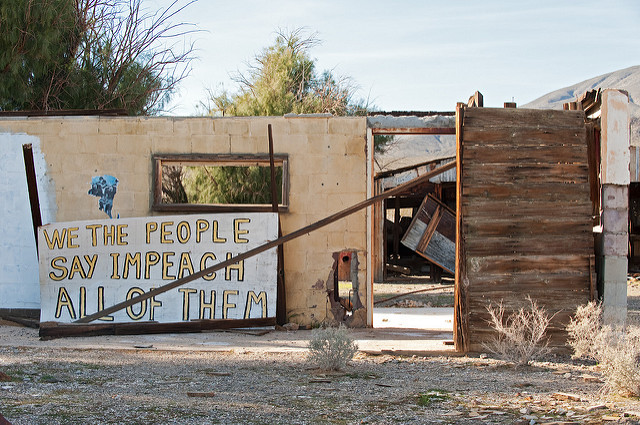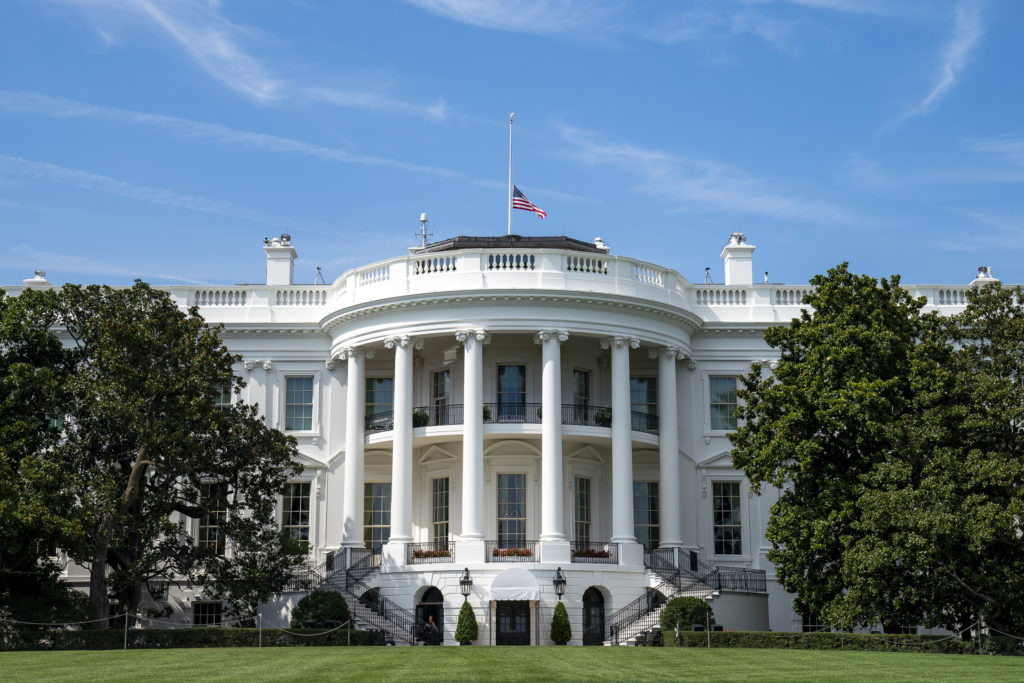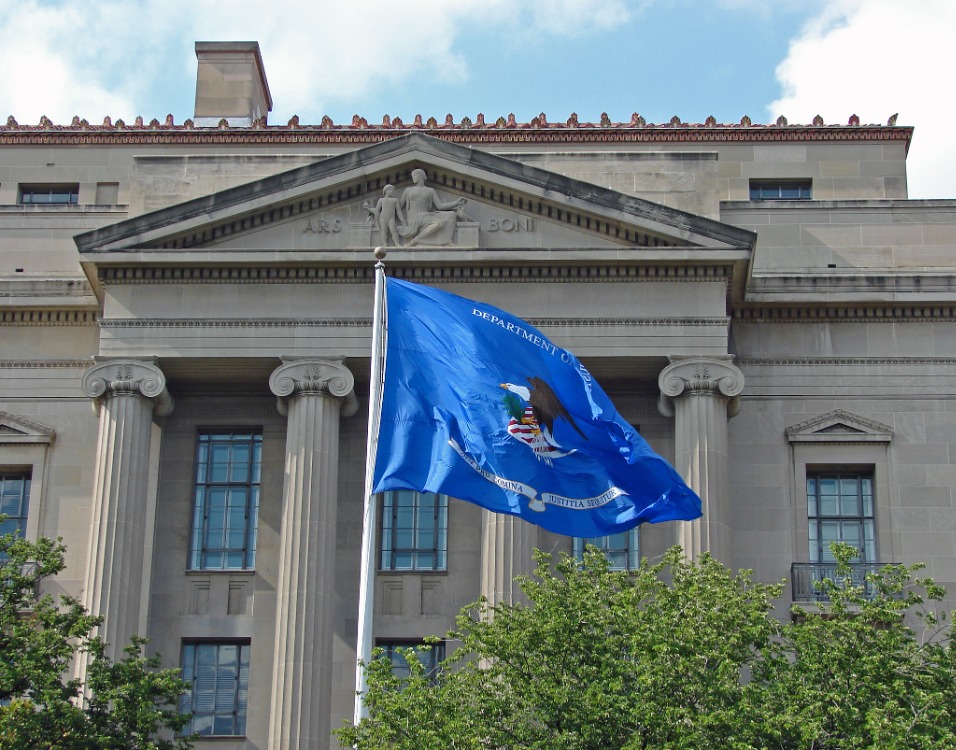When Is Impeachment the Right Remedy?
There is a tendency to think of impeachable offenses as like landmines. If the president accidentally or purposefully steps on one, then it explodes and he must suffer the consequences. Constitutional lawyers might find this line of thinking particularly attractive because it would allow them to get to work on identifying a finite set of actions as high crimes and misdemeanors and to set Congress about the business of determining whether the president has actually committed such offenses.

Published by The Lawfare Institute
in Cooperation With

There is a tendency to think of impeachable offenses as like landmines. If the president accidentally or purposefully steps on one, then it explodes and he must suffer the consequences. Constitutional lawyers might find this line of thinking particularly attractive because it would allow them to get to work on identifying a finite set of actions as high crimes and misdemeanors and to set Congress about the business of determining whether the president has actually committed such offenses. Or, if Congress so prefers, to outsource that investigative work to a special counsel who could effectively make the impeachment process itself a mere formality.
This is the wrong way to think about impeachments. Impeachment is a powerful political tool for addressing a class of important and distinctly political problems, but it is not always the right tool for the job. Politics is inescapably at the heart of any impeachment, particularly a presidential impeachment. It is not just the case that political calculations will inevitably affect how members of the House and the Senate exercise their constitutional responsibilities, though that is certainly true. It is also the case that impeachments require the political act of persuasion to convince the public and legislators in a partisan political environment that the dramatic step of impeaching and removing a high government official is warranted in a particular situation.
Borrowing from James Madison, Gene Healy has recently characterized the impeachment power as the “indispensable remedy.” Madison thought it obviously necessary to have “some provision” for “defending the Community against the incapacity, negligence or perfidy of the chief Magistrate.” Election, a limited term of office, and a host of checks and balances would not necessarily be enough to protect the republic from an unhinged or villainous president. The Constitution needed a fail-safe to backstop its other protections against the abuse of power.
This raises the question of when the use of this particular remedy might be warranted. It is surely not the case that it is warranted whenever a government official commits something that might be labeled a high crime or misdemeanor. As Justice Joseph Story pointed out, it would be a “vain exercise” to try an individual for a high crime and misdemeanor after that person had already left office. The purpose of the impeachment power was not to inflict punishment on the guilty but to “secure the state against gross misdemeanors.” The “remedy of impeachment” is appropriate in some circumstances, and not in others. If it is a fail-safe, as Cass Sunstein has argued, then it is presumably a last resort, to be deployed when all else has failed. If it is a mechanism for securing the state against serious threats to the system of government, as Story argued, then it presumably needs to be demonstrated that the state must be secured against such a threat. If it primarily offers an avenue for removing an officer who needs to be removed immediately, as Laurence Tribe and Joshua Matz have argued, then the key question for the members of Congress to ask is whether this officer, in fact, needs to be removed immediately. Could other political remedies be applied that would be equally or more effective at addressing the nation’s political ills? Answering that question will necessarily require contestable political judgment, but explaining how that question should be answered is a necessary part of the political task of persuading the nation that impeachment is appropriate.
In our present circumstances, it is worth considering what offenses President Donald Trump is thought to have committed and if immediate removal from office would be the most appropriate remedy to those particular offenses. Democratic Rep. Al Green of Texas has been a vocal advocate of the president’s impeachment. Green’s proposed impeachment resolutions have focused on the president’s rhetoric, asserting that the president has been “sowing discord among the people of the United States by associating the majesty and dignity of the presidency with causes rooted in white supremacy.” One kind of objection to Green’s resolution is that impeachment should be reserved for criminal offenses, but that would be an overly narrow reading of the impeachment power and a misunderstanding of the purpose of entrusting Congress with the power to impeach and remove. But if impeachment can be used to address political offenses, that does not by itself establish that it is particularly effective at addressing every political offense.
On the one hand, removal might not be particularly effective at addressing the alleged political injury to the American people caused by Donald Trump’s willingness to inflame racial tensions. On the other hand, other political actions might be as effective as impeachment for stigmatizing racially charged rhetoric. As Republicans discovered in 1998, it is hard to rally the necessary numbers behind an impeachment effort when a resolution of censure would serve just as well.
The president’s long-running unhappiness with the various legal investigations surrounding his administration has similarly fueled impeachment talk. Democratic Rep. Brad Sherman of California has pushed for immediate impeachment on the grounds that Trump had tried to persuade then-FBI Director James Comey to drop his investigation of then-National Security Adviser Michael Flynn. “What else do we need?” From the firing of Comey to the president’s alleged suggestion that Geoffrey Berman, the Trump-appointed U.S. attorney for the Southern District of New York be put in charge of the criminal probe of Michael Cohen even after Berman had recused himself from the matter, the president has looked for ways to bring his legal troubles to a more rapid conclusion. The New York Times characterized this as “Trump’s two-year war” on the Department of Justice. Trump’s critics are eager to label such “intimidation, pressure and humiliation” as criminal acts of obstruction of justice, deserving of prosecution and jail time as much as impeachment and removal. As Jack Goldsmith observed, however, it is also possible to look at this record and see evidence that the Department of Justice’s “independence has to date prevailed.” If Trump were effectively blocking the ability of government officials to get to the bottom of Russian interference in American elections or potential campaign corruption, then his removal from office might be the only means for clearing the obstacle and allowing the investigations to continue. If Trump has instead been circumvented, checked and reduced to futile complaining, then impeachment and removal seems less necessary. If it were demonstrated that the president was the agent of a foreign government, then his immediate removal from office would be essential. If Trump is merely a “useful idiot” for Putin, then the threat can be contained by other means.
Nearly two years ago, I advised that it would be possible for the president’s allies to walk him out of impeachment territory. Doing so, however, required demonstrating that any mistakes that Trump, as candidate or as president, had made were in the past and that less dramatic remedies than impeachment and removal were available to ensure that the apparent political problems were mitigated, if not necessarily solved. In the subsequent months, we have learned that the president cannot be easily corralled. He is undisciplined and resists any efforts to change operational practices and institutional arrangements in ways that might help reduce his proclivities to cause self-inflicted wounds. He continues to go off message and make damaging and divisive public statements. He continues to ignore advice from his national security staff. He continues to look for ways to hamper the legal investigations of himself and his associates. He continues to involve himself in his business enterprises. Moreover, the president’s allies have too often preferred to look the other way rather than confront the president’s problems. In this respect, the president has not helped his own cause and as a result might have strengthened the case for impeachment and removal by demonstrating that he is unwilling or unable to change his ways. Nonetheless, the people and institutions around him have persisted in pursuing their particular missions despite the president’s unhelpful behavior, perhaps demonstrating that the president’s antics have not yet created the kind of intolerable dangers that call for the most dramatic constitutional remedy. Most notably, the Department of Justice has pushed ahead with its myriad investigations even though the president clearly would have preferred that those investigations had been dropped months ago.
If Nancy Pelosi is reluctant to move forward with an impeachment inquiry, that reluctance reflects in part her judgment that the president’s misbehavior is bearable. In this line of thinking, Trump may be corrupt or oafish, but he does not pose much of a threat to American democracy. Pelosi has insisted that Congress should move forward with impeachment on a bipartisan basis, or not at all. House Committee on the Judiciary chairman Jerrold Nadler has long contended that presidential impeachment would be warranted only to defend the republic against a would-be “tyrant.”
Those who would hope to persuade the Democratic leadership, let alone Republican senators and voters, that impeachment is the right remedy for the problems currently confronting them would have to do more than show that the president has done something that could be classified as an impeachable offense. They would need to demonstrate that Trump’s continued occupation of the White House has become unendurable and that leaving him to face the electorate again in 2020 and to serve out the remainder of his term poses unacceptable risks to the nation.





